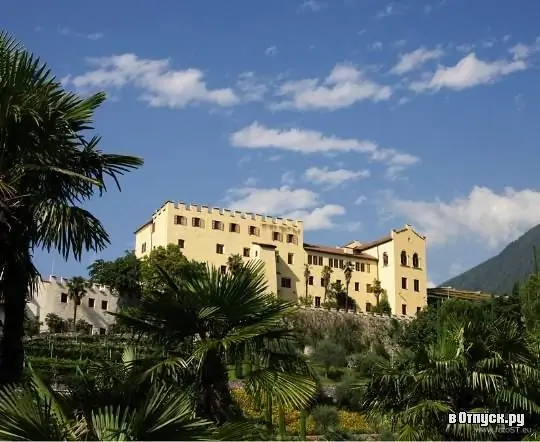
Description of the attraction
Trauttmansdorff Castle is located south of the town of Meran in the Italian province of South Tyrol in the Dolomites. During the years of the fascist regime, this medieval castle was called Castello Di Nova after the nearby small Torrente Nova stream. And it was built around 1300: the walls of the original structure and the ancient crypt are still visible from the southwestern side of the current castle. In the middle of the 19th century, Count Joseph von Trauttmansdorff rebuilt the castle in a neoclassical style and expanded it to its modern size. Several years after the end of the Second World War, the building was abandoned, and only in 2000-2003 restoration work was carried out here. The façade, chapel, crypt, a huge rococo hall and the second floor where Empress Elisabeth of Austria, known as Sisi, once lived, have been re-furnished.
Today, the castle houses the South Tyrol Tourism Museum - the so-called Touriseum. Its expositions, which occupy 20 exhibition halls, acquaint with the history of the origin and development of tourism in this region. At the same time, the collections of the museum are distinguished by originality and wit: here you can learn about the dangers that travelers who ventured to cross the Alps were exposed in the past, about the first local spa resorts and conquerors of local peaks. Three halls of the museum are dedicated to Empress Sisi.
In 2001, the park surrounding Trauttmansdorff was converted into a botanical garden, called the Trauttmansdorff Castle Gardens. During warmer months, the gardens are open daily. The park itself was laid out back in 1850, when restoration work was carried out in the castle. A frequent visitor to this park was Sisi, whose bronze bust was installed here after the assassination of the Empress in Geneva in 1898.
Today, the Trauttmansdorff Botanical Garden contains about 80 flower beds with native and exotic plants, arranged according to the place of origin. There are also plants characteristic of South Tyrol. Other "floristic zones" include coniferous and deciduous trees from both the Americas and Asia, flowering oleanders, Mediterranean cultivated plants, including cypress, figs, grapes, lavender and the northernmost olive grove in Italy. A very interesting section of the park, where you can see the characteristic Italian, English and the so-called sensual gardens. Of great interest is always the acquaintance with wollemia - one of the oldest plants on Earth, which was considered extinct millions of years ago, and was accidentally discovered in a single place in Australia only in 1994.
In addition, the Trauttmansdorff Castle Gardens are home to Aesculapian snakes, an aviary and rice terraces, tea plantations and a Japanese floodplain forest.






